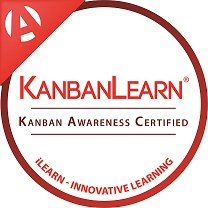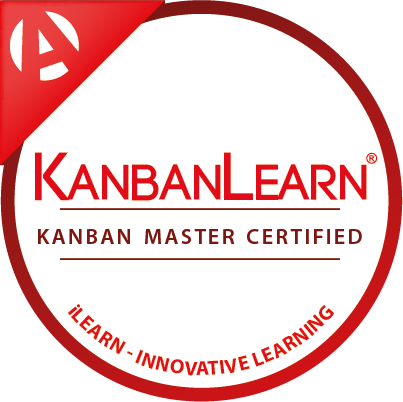KanbanLearn® Courses
KanbanLearn® Kanban training courses and exams for Kanban and Agile management provided by iLEARN
Summary of Topics
Availability and prices of KanbanLearn® courses
KanbanLearn® online courses (e-learning) with exam
In this showcase you will find a selection of training courses and exams concerning Kanban learning area and KanbanLearn® certifications.
If you do not see a specific Kanban course or Kanban exam, please contact us.
KanbanLearn online exams
In this showcase you will be able to purchase KanbanLearn® Kanban exam vouchers only to take the online exam with iLEARN Examinations, in complete autonomy.
KanbanLearn® distance - live virtual courses calendar
In this showcase you will find the next available dates for Kanban KanbanLearn® courses (live virtual sessions) with online certification exam. These courses are provided via web-conference in real time by our accretited trainers. KanbanLearn certification exams will be taken online with iLEARN Examinations.
What is Kanban?
Kanban is a term that has several meanings depending on the context. In manufacturing, first and foremost at Toyota, it was a visual control method that was part of Just in Time and Lean Manufacturing methods.
To summarize, Kanban term can refer to different things in different contexts:
- in manufacturing (originally in the Toyota environment), Kanban is a visual method (tool) used to control production as part of Just in Time (JIT) and Lean Manufacturing;
- in service industries (such as software), the “Kanban Method” is a method of defining, managing, and improving services that deliver knowledge work;
- generally speaking, “Kanban” or a "Kanban System" is a visualization system (visualizing the process and work in progress) for managing the workflow.
The “Kanban Method” and “Kanban Systems” not only allow the management and control of the workflow (for example by limiting the amount of work in progress) but also aim to improve the flow itself (the process) and achieve this.
The "Kanban System" and the "Kanban Method" have common work visualizations, but the "Kanban Method" requires additional activities (such as continuous improvement) and allows for greater benefits.
What is Kanban useful for?
Not only does Kanban work in different contexts, but it can also be applied in very different ways, with different benefits. David J. Anderson suggested three levels:
- Sustainability Agenda (focused on transparency, balance and collaboration)
- Service Orientation Agenda (focused on customer orientation, flow and leadership)
- Survivability Agenda (focused on understanding, consent and respect)
Each layer is value-driven, builds on the previous layer, and provides specific benefits.
In simple terms, in the Sustainability Agenda, we use Kanban to coordinate and balance work processes. This also applies to specific teams or departments. This often results in significant improvements in performance (e.g. increased throughput) and predictability (work done on demand within expected dates).
Service Orientation Agenda shifts the focus from the process to the customer. This means, for example, getting better qualifications before you start. Customer-centricity improves customer satisfaction and meets their needs. Also, Kanban is used at this level as a thinking tool to improve the process.
Survivability Agenda focuses on team values, behavior and engagement. By improving these aspects, all evaluation factors (performance, quality, time-to-market, etc.) are increased not only at the team level, but also at the organization-wide level.
So, for Kanban, we need to choose not only the domain and process to apply it, but also the level of application (Agenda) that increases the benefits accordingly..
How do I get Kanban certified?
iLEARN developed the KanbanLearn® qualification scheme to support the spread and develop the knowledge of Kanban Systems and Kanban Method.
Kanban Awareness Certified
Kanban Awareness is a free exam that is intended to confirm if you own a basic understanding of Kanban Systems and Kanban Method.
Kanban Master Certified
Kanban Master Certified (KMC) qualification is the first qualification in the KanbanLearn® scheme fit-for-purpose for whoever is interested in having a deep understanding of “Kanban Systems” and/or “Kanban Method”.
How can I study Kanban?
iLEARN provides KanbanLearn® training courses that are helpful to achieve the knowledge and related certifications. Courses are available with different delivery methods:
- Classic
- On pre-scheduled dates: traditional classroom training at iLEARN premises
- in-house: traditional classroom training scheduled based on client needs and at customer’s or iLEARN premises
- Distant learning: following a remote classroom by means of a web conference
- E-Learning: training provided through our online learning management system from anywhere and anytime
- ONE-to-ONE: access to e-Learning platform and interactive sessions via web-conference with the accredited teacher
Add a coaching session
By purchasing any KanbanLearn® package, you have the possibility to optionally add coaching sessions with one of the expert trainers. This is very helpful because Kanban method and Kanban systems are very practical.
During the coaching sessions you will move from theory to practice and apply Kanban method in your working environment, putting into practice the concepts learned during the training courses. Sessions are held using an advanced software solution for Kanban management.
Here below you can find some examples of what is practiced during the coaching:
- Build a Kanban board
- Manage the Kanban tasks (cards)
- Manage priorities
- Manage the impediments
- Collaborate
- Limit the Work in Progress
- Analyze the workflow:
- Progress
- Throughput
- Work in progress
- Throughput time
- Meet the deadlines
- Quality
- Problems
- Build a task qualification Kanban board
- Improve and optimize performance over time
- Kanban boards for personal use
The topics will be discussed according to needs of the participant.
Get free access to a Kanban tool

By purchasing any KanbanLearn® Kanban training course, you will get 1-year free access to EasyBoards®, one of the best enterprise Kanban software tools integrated in our training offer for free. This EasyBoards® free license will allow you to practice and simulate real project scenarios while you are preparing for KanbanLearn® Kanban certification exams.
What can you do with EasyBoards®?
- Configurate kanban boards
- Collaborate with your team members
- Send or receive notifications and warning alerts
- Create new kanban board templates
- Create new workflows to support business processes and agile visual management
- Analyze your workflows figures and KPIs and start improvements
KanbanLearn® - Digital Badges Available
The KanbanLearn® qualification scheme includes the achievement of the Digital Badges by passing the corresponding certification exams.


Learn more about iLEARN Digital Badges here.
Earn PDUs with Kanban
Our KanbanLearn® training courses can provide Professional Development Units (PDUs) through an auto-declaration procedure on PMI’s portal. Here below you can find more details about the PDUs allocation for each level of the KanbanLearn® certification scheme:
- KanbanLearn® Kanban Master Certified: 10 PDUs
To learn more about the PDUs allocation according to the PMI Talent Triangle and to discover all of our online training courses and exam packages for each certification level, click on one of the links above.
Please note that, in order to auto-declare PDUs attending this course provided by iLEARN, the purchase of the attendance confirmation (attendance certificate) in electronic format (pdf) is mandatory. Select the option to add the attendance confirmation at the moment of purchase and proceed to checkout.
For more information about PDUs and how to claim them to maintain your PMI qualifications, please visit this page.
Our e-learning platform is optimized for access via web browers, including mobile!

 Login
Login